#chainsaw man meta
Text
There's something heartwarming about Denji thinking of the answer for Aki's question while staring at their laundry outside.

I really love how the actual answer was being transmitted through this scene.
I wonder how little Denji's clothes before he met Aki and joined the Public Safety Hunter. I bet he never even hangs his laundry that much. And seeing how his clothes, Aki's, Power's hung out there... maybe it's small realization that he finally has family.
#denji chainsaw man#denji#aki hayakawa#hayakawa aki#hayakawa family#power chainsaw man#chainsaw man meta#chainsaw man#fujimoto tatsuki#tatsuki fujimoto
2K notes
·
View notes
Note
hi i'm the op of that post (stackslip) PLEASE elaborate on chainsaw man's metanarrative
hi! um. you've given me free reign, i hope you know what you're doing. anyway: fair warning in advance that this is based entirely on how i like to interpret and think of the csm story and doesn't necessarily hold true, partly because of the level of abstraction that i'm operating at here. i'm normal and i like metanarratives a normal amount. this might be a little long. but.
um. thinking about how protagonism in CSM is inflicted on denji by the author insert that is makima. i've brought up the Icon of chainsaw man before in my part 2 analyses but basically:
the Chainsaw Man is the role that denji occupies in the story, right? it's the title of the manga. it's what the public Sees him as. it's what makima quite literally produces. the relationship between denji and the chainsaw man in both aspiration and idealisation forms a major stem of both part 1 and part 2's narrative.
this production occurs on two levels: (1) what Chainsaw Man is, and should be, and (2) how denji is developed as a protagonist by makima.


"you don't get him at all." chainsaw man is her blorbie (i think i'm funny). the point is that the Presentation of chainsaw man, the one that the audience is initially set up to expect, is almost entirely synonymous with makima's version of the CSM that we get later. i think a lot about how part one borrows from, amplifies, and later subverts shounen tropes. the CSM as an idea persists in how it's discordant from denji's normality in part 2 but part 1's direction in how denji voluntarily inhabits the chainsaw is what i'm pointing at here. (there's a lot to be said about how denji's idealisation as tied to the icon of the CSM is intertwined with his wants but that's not relevant in this meta except in the minutiae of his adherence / resistance to this role.)
the thing is that makima is instrumental in pushing this role onto denji. she sees chainsaw man, he is chainsaw man. it's (and i sound insane here but please hold on, i beg) like writing.
i think her addressing him in the last battle scene, the "i'll kill you personally" is indicative of her finally divorcing denji from the chainsaw; forming The Chainsaw Man in full, while still obviously curating the denji that would support this formation throughout the story.
a small side here but: "but she never even saw me once, even from the start." // fujimoto's writing actively utilises characters towards the end goal of shaping the protagonist. this struggle here is one between a character and an author.
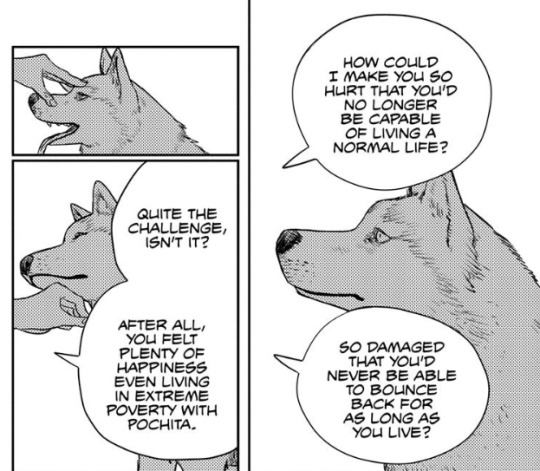

now continuing; the way that makima provides for and then systematically removes these initial connections simulates traditional story structures with its setup, its confrontation and resolution. her excellence as an antagonist rests upon her identity as a narrative device which develops the protagonist and pushes him through this structure. the conflicts and the loss that a protagonist usually naturally (at least in-world) goes through in a story are instead all artificially created by makima.
"how could i make you so hurt that you'd no longer be capable of living a normal life?" // her molding of denji isn't just passive emotional manipulation, it's active writing. she herself is aware of the tropes and the character relationships that are being built up, that are being subverted. she herself embodies, espouses and resolves the themes of multiple arcs (thinking of the end of the bomb devil and the darkness devil arc here / thinking of how she draws the shutters on ignorance and on wanting).
there's a lot i try to extrapolate from her commentary on movies during her date with denji especially in context with the story simulation that she herself is doing throughout the manga. i find it interesting how the ending to the movie date or the "good" movie founds itself on shared feeling: denji sees makima cry at the same movie as he does.
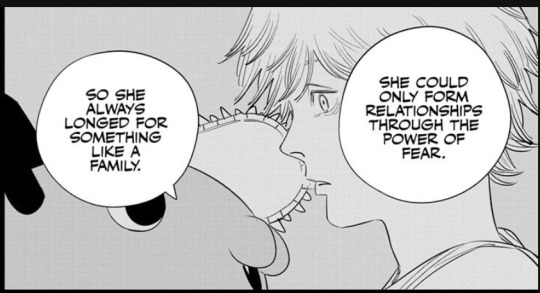
"the drinks yesterday were delicious." // you talked about her goals already in your post but makima's search for real intimacy (and equality in a relationship) coincides with denji's one. to me, it comes off as a writer trying to find a mirror of understanding in their own creation. the way she visualises the CSM (as "chaos" to her order) reveals a relationship quite like the flawed connection that one has with characters one makes: and this relationship is what denji (the 'stage' of this process) responds to so emphatically: "she wasn't looking at me this whoole time."
so, yeah; CSM to me operates at two levels: the one with the deeply human character relationships that construct the story and another layer where fiction and ideation mesh. it's important to note that this is something fjmt quite likes doing in his other work: using characters to specifically engage with the telling of his stories or exploring his characters' nuanced reactions to fiction and its weight.
thinking of makima as the 'Author' is misleading, though, and it ignores the fact that makima is both a device deployed by the actual author and in-world by the structure that are the higher ups. she is the control devil; she controls the scaffoldings of the story but she in herself is an agent of the author, of the narrative, of the aforementioned higher ups.
i don't know. is an artist ever truly original in their art? do they not operate within a greater structure, borrowing from and being regulated by it and its interpretation of their work? are makima's plans not ultimately upset by her creation?
denji materialises as a character from multiple active sources instead of the unitary source that makima believes herself to be. he's a passive character and yet he refuses to be a stable creation (psst. it's that universal tussle between the living art and the artist -- something fjmt's already tackled in his oneshots).
i don't know (2). this interpretation's been simmering in my head for a while, but i wasn't very Sure about it. but hm. this writeup primarily bases itself off part one (since it's well. complete) but image and image production specifically coming into fruition as a theme in part two makes me feel increasingly confident in this interpretation. it's strange how it somehow all ties back into storytelling.
#this is because i'm so writingpilled metacelled at all times. literally.#like. i'm obsessed w reze as of now but that Thing that was makiden throughout the manga. actually still has me in a chokehold.#taps makima and denji -- these two can fit so many Themes into them.#and even part 2's grappling with structure#and how devils are written also as roles and through their interpretations. so so tasty#chainsaw man#csm meta#chainsaw man meta#makima#denji#crow.txt#crow.asks#stackslip#<- is it OK if i tag this? thank you so so much for the ask
68 notes
·
View notes
Text
The first time you read Chainsaw Man, you laugh at how Denji is such a shallow, sex-obsessed weirdo that he only saves women and throws cars with guys in them at devils.
The second time you read Chainsaw Man, you realize there's more than that going on. Denji is obsessed with sex and such because he was denied any kind of intimacy and never learned about any kind except sexual intimacy.
Meanwhile, he preferentially saves women for the same reason that he implicitly trusts women (even the ones who tried to kill him or steal his literal heart) and distrusts men (even ones who tried to help him and just suck at it). He was physically abused by his father, then economically abused by the men in the yakuza, for his entire childhood; he expects men to treat him like trash, and expects women to treat him better.
The third time you read Chainsaw Man, you realize that, no, it's still pretty funny when Denji goes "What do you mean I'm aiding humans?" and throws the occupied car at a devil.
#denji chainsaw man#chainsaw man#chainsaw man meta#characterization#media analysis#meta#gender#tw sex mention#tw child abuse mention
269 notes
·
View notes
Text

cmon mappa you did not have to do this
#csm meta#chainsaw man meta#csm analysis#chainsaw man analysis#chainsaw man#csm#aki hayakawa#himeno#akimeno#aki x himeno#himeaki#akihime#im not even a hardcore akimeno truther i think there is worth in platonic readings of their relationship. but also the fucking framing dude#mappa storyboarders went silly for episode 8
151 notes
·
View notes
Text
my initial post about this got flagged as mature content because of the manga panels, you can see the illustrated version here.
question: sorry to bother but could u elaborate on denji almost becoming quanxi??
ok, so we must first think of how Fujimoto writes side characters. they are there to not only enhance the world and plot but also serve the narrative in a more symbolic way too. like the three immortal brothers aren't only there for absurd dark humour but also because we need a reminder that just because this world is seeped in death, life is still precious. also, Aldo's moment of realisation and begging for forgiveness was in connection to the theme that ignorance is bliss, as in when you close your eyes to the truth for too long, reality will hurt you.
in her very first appearance, she is basically living out what Denji believes to be his dream: having sex with beautiful women.
she is a hybrid, like Denji is, though we are not exactly clear on what her devil heart is (i think Arrow or Bow devils?), and she is incredibly strong.
regarding Quanxi herself, she is willfully ignorant, believing that to be the key to her happiness. in an exchange with Kishibe in chapter 61 she says: ‘The secret to leading a happy life in this world … is that ignorance is bliss.’ and that is the core principle of her character. we can see it even in the small moments before this exchange, like when she and her girls are in a sushi restaurant and Pingtsi tells her some facts about fish, and her mood is soured by it.
during the fight with the dolls, this is the advice she bestows on him: ‘if you understand it that way, you can kill them, can’t you? Ignorance is bliss.’ she is talking about forcefully forgetting that the dollified people are still alive and can feel pain. ignoring the truth so that his conscience don’t eat away at him.
and after the international assassins arc concludes, we can see him really living it, we have plenty of key moments where Denji acts out of wilful ignorance, avoiding reality wherever possible. it even seems to work out for him.
until it doesn't. and there is a choice before him: close his eyes and continue to live under the belief that Makima is his saviour or open than and face reality.
if he were to live life as Makima planned he would've become a blind tool whose only hope of finding happiness would be to adopt ignorance in the same way Quanxi has. tools know nothing except how to be used, and it doesn't ultimately matter if they change hands (like how Quanxi is on Makima's side through the Control Devil arc), as long as they serve their purpose.
there is, of course, A LOT more to be said about these themes of ignorance vs knowledge and the balance between them in Chainsaw Man but i think i've summed the connection between Quanxi's fate and Denji's possibilities well enough here.
77 notes
·
View notes
Text
you know what's really interesting about chainsaw man?
it's funny.
like, as much as chainsaw man is dark, often savage, frequently gory, and more often than not, tragically and deeply sad, there are sharp moments of humor. and not just ironic humor, the kind that's acceptable in grimdark stories (of which csm is not, though it could have been) but dirty humor, absurdist humor, dry humor. it's that humor that makes csm feel so genuine despite the crack premise of "boy with chainsaw blades for arms fights monsters."
because, don't get me wrong--chainsaw man is a weird manga. it deals with universal themes (as most works do) like grief and abuse and love, and there's hot wamen and sick monster designs, but it's also just really fucking weird. you absolutely cannot divorce chainsaw man from the weird. like. one of the central narrative devices is the various forms "cannibalism" can take, and i'm not just talking about the end of part 1. that is a weird fucking route to explore interpersonal relationships but goddamit it works, and the only reason it works so well is because fujimoto-sensei can and will slip in a joke about makima regenerating from denji's shit. csm is macabre but goddamn is it committed to the bit.
115 notes
·
View notes
Text
I’d blame @easy-revenge being an enabler, but really I just enable myself.
I want to talk about how the episode 8/“First Death” ED is an absolutely perfect representation of grief.
The very first shot is of two cigarettes. And though smoking is something we the audience have come to associate with Himeno, the presence of two of them suggests that we are meant to view this shot as symbolic of the relationship between Himeno and Aki. From the very outset, the ED makes it clear that the thing we are supposed to take away from this sequence (and, honestly, probably the episode in general) is the strength of their connection. And immediately after this, we get a brief glimpse of a cemetary, crosses marking graves and crows perching on them. Whatever this connection was, it is broken. Himeno is dead.
It’s worth noting that once the guitar kicks in (and thus we have a clearer instrumental that more cleanly represents what we tend to think of as a “song”, instead of the melody-less, monotone, horn-like sound effect backed by drums at the beginning), we are shown more scenes of Aki and Himeno-a memory, a beautifully done shot of both of them lighting cigarettes from the same lighter simultaneously, with all of their history flashing behind them (with special mention to Makima’s eye, adding a creepy and unfortunate shadow over their intimate moments-just like in life), and a scene of an older Aki approaching a younger Himeno in the graveyard where they met, the first of several Grief Shots, all of which never fully show Himeno’s face. Aki is at a physical distance or, in the case of the shot of her walking through a field later on, not present at all. However close the two of them were in life, and however strong or even accurate memories of her can be, she is, ultimately, inaccessible. She’s no longer a living, breathing person, but a specter. She no longer lives, she haunts. The frames shift in and out of focus, both highlighting both the confusing, disorienting nature of personal loss, and creating an effect similar to crying.
We have some slow-moving shots of other characters (including a wonderfully creepy shot of Makima’s eye opening in especially painstaking slow-motion, which...every single animation choice they make with her is a hell of a piece of foreshadowing--oh, and don’t even get me STARTED on the perfect timing of the background shifting to black with a literal explosion of red on the off-beat at the end of the musical phrase *chef’s kiss*), creating a sinister atmosphere, showing us how serious the situation is, reminding us that there are other people in this story to care for, but we quickly shift back to Aki and Himeno, on a bench, at (relative) peace (except not really, because it’s clear that Aki is Thinking About Revenge, but, hey at least they’re not in immediate danger).
Over the course of this ED, we are treated to parallel shots of Himeno in a forest-the first, completely naked, head down, hunched in on herself and obviously deeply sad. The second, in her trademark sleepwear, a sly, slightly flirty smile on her face, still a little folded in on herself, but sitting in a pose of relaxation rather than despair. This comes after, in succession, another Grief Shot of Aki at the graveyard, a butterfly flying through the field Himeno was walking through earlier (now empty-once again, as we are reminded, she is gone), and a screen full of flowers immediately wilting, all suggesting that this is how Aki chooses to remember her-not as a helpless victim of tragedy, but the vibrant, unapologetic person she was in life. There’s a sharp, overlit, dreamy filter over her in this later shot--this is how Aki sees her, someone who deserves to be memorialized, but also someone now far away from him, made distant and different through death.
IN ADDITION (and this is the part where I REALLY start to go feral), the singer’s voice only fully lets loose during the scene of Aki and Himeno fighting together. It’s in a higher register, and the melody doesn’t move at all, staying on the same note. High register chest voice (for those who are not as familiar with singing terms, this, in simplified terms, is basically “not falsetto”) is usually instinctively associated with raw, unbridled emotion. Mainly because it’s farther away from most people’s natural speaking voice, so the approach, vowel modification, and support involved make it harder to sing in healthily, and more difficult to vary in volume, leading to a usually uniformly loud and powerful sound. This sense of raw emotion only comes when showing us just how in tune these two are, just how well they work together, just how easily they are on the same page. The conscious choice to use a vocal technique/register commonly associated with heightened, intense emotion tells us what this connection truly meant and, consequently, conveys the gravity of what has been lost.
And interspersed with this fight, still in the midst of this full, raw vocal display of emotion, there is a shot of their hands connecting, lit in golden-yellow. A casual, automatic moment of physical connection, even in the midst of a dangerous and distinctly non-intimate situation. Yes, it’s devastating that we’ve lost a good, competent team. But even more devastating is that we’ve lost something more than that, something more than even a friendship; we’ve lost a partnership. Even more than coworkers, or even close friends, Aki and Himeno were partners.
This becomes even more overt when the singer shifts into a half-chest-voice, half-falsetto cry (expertly shifting between these two registers, I might add), the furthest jump between notes in the whole song so far present here, and it’s not even on a specific word. Just a vocalized “ah.” Loss cannot be put into words, and sometimes all you can do is sigh or sob or scream. This is the natural culmination of everything we’ve seen, and it is crushing.
The animation shifts in and out of focus again (memories aren’t enough, having a partner for some, not all of your life, isn’t enough), and we have a slow shot of Aki opening his eyes this time. But instead of being ominous or unsettling like in the case of Makima, his eye stays downcast before looking ahead with something bordering on a thousand-yard-stare. This is not horror or a warning, this is grief. And ultimately, despite everything else going on, this is the emotion that wins out. This is the point (at least for now, at this particular moment in the story).
We stay mostly in the graveyard for the rest of the ED, (there’s no use in pretending this is anything other than a mourning song, now), minus a brief moment of Power and Denji looking concerned, while Aki sways slightly, a tad unbalanced (backed by an equally unsteady trill in the guitar line). The stillest we’ve been this whole sequence is a few seconds of Aki simply standing in shadow, head tilted slightly downward, holding flowers, gazing at graves. Grief is hard, it’s paralyzing, and it can be (at least at first) all-consuming. This stillness is broken by a flash of bright-dreamy-filter Himeno (once again, not showing her whole face-just her lips this time), just like how memories and hurt associated with grief can come up violently and unexpectedly. And, now that we’ve fully established this as a Grief Song, when the melody involving the chest-voice-falsetto combo repeats to fill out the musical period and resolve its cadence, we now have words (in fact, we have more syllables than expected) and I don’t think that this particular musical choice matching up with the full shot of Himeno in the forest as fully memorialized by Aki is a coincidence. Himeno is re-realized in some way, and so the ability to put this feeling to words is, too. This memorialization can serve as a brief moment of respite, and so we can return to proper lyrics, instead of a wordless keening.
More of Aki alone in the graveyard, and even as we get a few bars of guitar outro, the somber atmosphere doesn’t let up-Aki’s slow trek through the seemingly endless stretch of graves marked with crosses is bleak and lonely. The last shot set to music is a close-up on his face, looking forlorn and lost at what would be the camera if this were a live-action show.
And then. Cut to silence. A brief shot of flowers (the ever-immortal symbol of grief over death) and a lighter (the ever-immortal symbol of Himeno). Once again, this is not just sadness over a death for the sake of it being a death. This is a loss. This relationship was important, and the melancholy and heartbreak of watching this character die is inextricably tied to the loss of the particular interpersonal connection between Aki and Himeno.
(Also, fun fact: this song is in g minor, which a) has two flats, and b) was a popular key choice of Mozart himself, and is considered to be The Key™ in which he most effectively communicated feelings of despair/tragedy/etc. So. Basically I’m losing my mind in real time.)
There’s also the fact that the beginning and the pre-chorus don’t really have a “key” per se. There’s definitely a background accompaniment, but it’s more general sounds rather than specific pitches. (The bass comes the closest, but it doesn’t quite settle on a pitch.) Grief comes from a lack of something. And just like these parts of the song lack a pitch to center around and use as a home base, sometimes grief feels like you’re missing a part of your life, or even, sometimes, yourself. Maybe it’s not constant, but you feel and notice the absence acutely when it shows up.
And this lack of key/center pitch is eventually contrasted (during the verse and at the end of the pre-chorus) with a constant stream of “g” notes in the guitar line. The home base (or tonic note, if you will) of the scale of the key the overall song is in. That thing you lack, that you miss, that you’re grieving, it’s still there. Everything you had and then lost, you still remember. You still want it back. Grief is persistent and, it doesn’t just go away (even if things would be much easier if it did). It’s going to come up, sometimes in places you don’t expect, and it’s going to hit hard.
(And the fact that grief doesn’t go away carries over into how Himeno is treated in the narrative. There’s the heartbreaking scene in the hospital. There are the flashbacks Aki has before he kills the Ghost Devil. There’s him taking petty revenge on the man responsible for Himeno’s death and all the time he spends taking out, looking at, and eventually smoking the “easy revenge” cigarette. Himeno even features heavily in the ED for the episode after she dies. And I’m not going to spoil things for the anime-only crowd, but there are a few little moments later on in the story, too. Her death isn’t just something that’s forgotten, and her idea of “easy revenge” and making what little joys you can out of life to spite the miserable world around you continues to reverberate through the story, and for Aki specifically. We already see a little of this when he goes berserk on Katana Man despite claiming Himeno wouldn’t want that, and allowing himself to relax a little and even enjoy Power’s and Denji’s company in the episode 12 ending sequence.)
I’ve lost track of the amount of times I’ve watched this. And every time I do, I see something new. The level of care put into this sequence, of using every available tool at the animators’ and musicians’ disposal to so accurately and heart-wrenchingly portray grief is phenomenal. This is an absolutely, breathtakingly stunning ED, and I’m not sure I’ll ever see another one like it.
#himeno#aki hayakawa#chainsaw man#chainsaw man spoilers#csm#csm spoilers#meta#chainsaw man meta#csm meta#akimeno#(I mean. not really. I just choose to read their relationship as romantic because it adds to The Tragedy™ and I love emotional devastation)#akihime#aki x himeno#first death#chainsaw man episode 8#unhinged lady screams about music#behold! a creation!#I got two music degrees and an intense love of anime and I'm not afraid to use EITHER of them
77 notes
·
View notes
Text
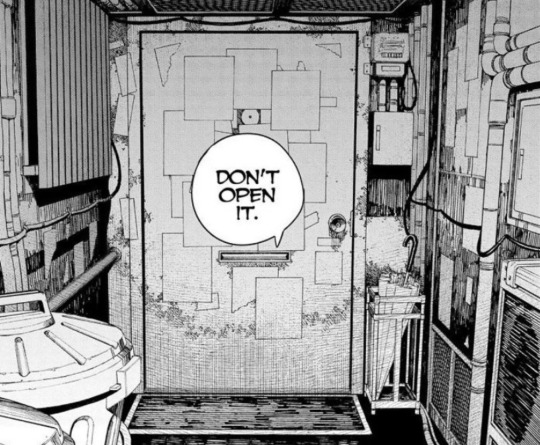
“ In writing, a door can represent many different things. A door can be the Unknown, physical obscuring whatever’s behind it, Infinite possibilities because anything could be on the other side. The Past, somewhere a character has already passed through, possibly closed and locked to be forgotten. The Future, the next step in a character’s journey. A door can represent Ignorance, limiting a character’s world view to the contents to the room that it’s attached too. But it could also be Opportunity, after all we’ve all heard the saying ‘I can open the door for you, but You have to pass through’. And a door can represent Choice, because ultimately it is up to that character whether or not they choose to go through. In chainsaw man, the door represents All of these things. ”
⫘⫘⫘⫘⫘⫘⫘⫘⫘⫘⫘⫘⫘⫘⫘⫘⫘⫘⫘⫘⫘⫘⫘⫘⫘⫘
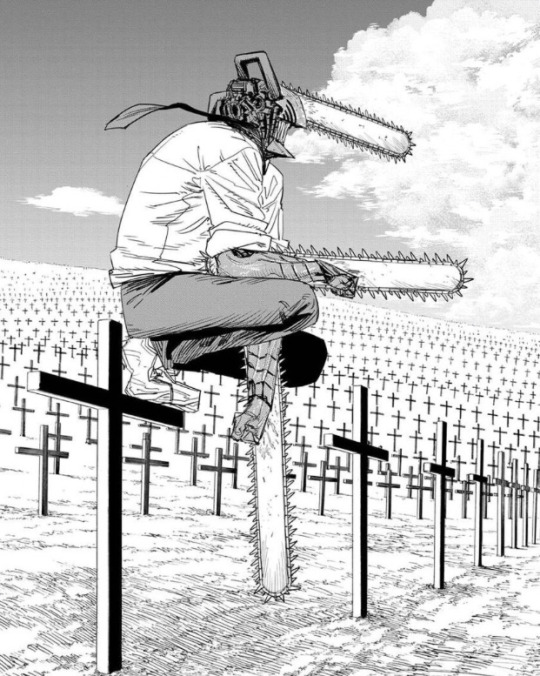
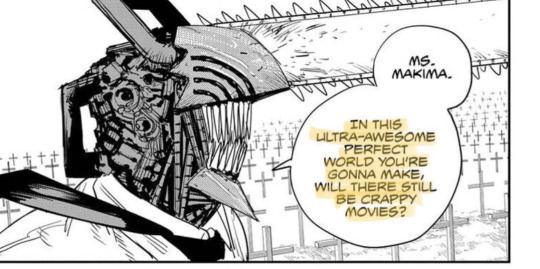
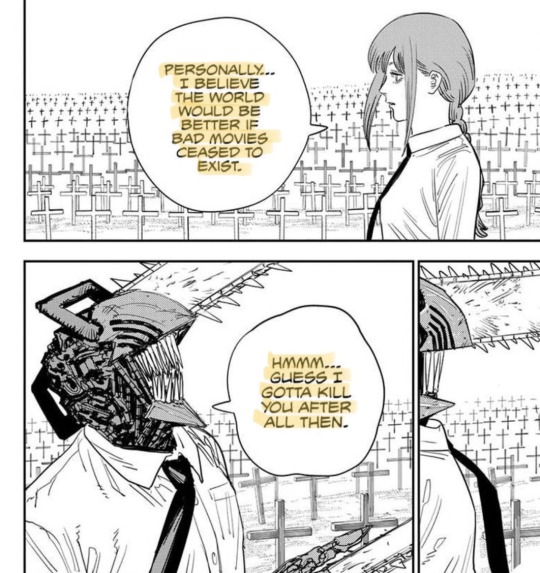
“ Denji sits in a grave yard awaiting makima and her people. He addressed makima and asks her a simple question. In the perfect world that she’s trying to create, will bad movies still exist. She responded that the world would be better without them. And he decides that if that’s the case, he has to kill her.
This simple question is a masterclass in subtle writing. On the surface it’s just a question about movies, but it’s so much more than that. It’s a clashing of their fundamental ideals as well as a sign of major character development.
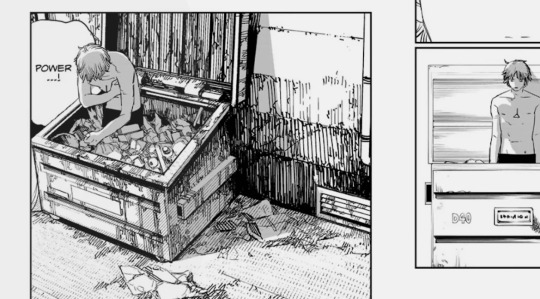
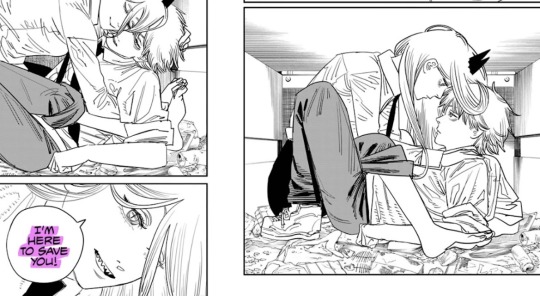
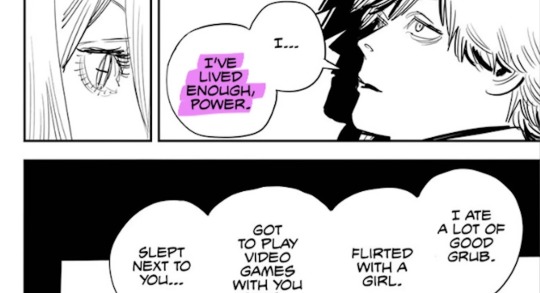
If we asked denji in the dumpster this same question, I’m sure he would agree with makima. Dumpster denji was blinded by grief and unable to see past that pain. He lost sight of anything beyond what he already experienced and decided the pain he felt did not outweigh the positives he gained, the food he ate, the video games he played, the Family he found, none of it was worth the pain of losing them. He believed he would have been happier if he never knew any of that, and continued living in poverty, Ignorant of Anything Better. Denji lost the will to go on. He’s so broken up about losing power and aki, that he feels like it’s just his time to die. He got what he wanted out of life and he doesn’t need anything more.
By becoming chainsaw man, denji opened a door that led into this life. Denji had a choice way back then, to continue being chainsaw man or to be killed by makima. By choosing to join public safety, denji stepped through that door, and opened himself up to all of the pain associated with those experiences.
Dumpster denji would have rather left that door closed. But denji has had time to process everything that’s happened. He’s had time to process about what he’s gained, what he stands to loose, and what he still has to experience.
Life itself is a series of doors and denji stands before one now. That door represents the Unknown hidden behind it, the infinite possibilities available after opening it, the Past he has to confront, the Future still ahead of him, the Ignorance he stands to loose, the Opportunity he stands to gain, and the Choice he has to make. Denji knows that if he goes through that door, he risks being hurt worse than he is now, but there’s also a chance that he’ll come out on the other side happier than he ever knew was possible.
Makima wants to knock that door off its hinges. She wants to remove the possibility of pain, by getting rid of anything bad in the world. But Denji knows better. Experiencing pain and happiness go hand in hand. You can’t understand the good without experiencing the bad. You have to watch 9 bad movies before you can truly appreciate 1 good movie. That’s why denji has to defeat makima and walk through that door. ”
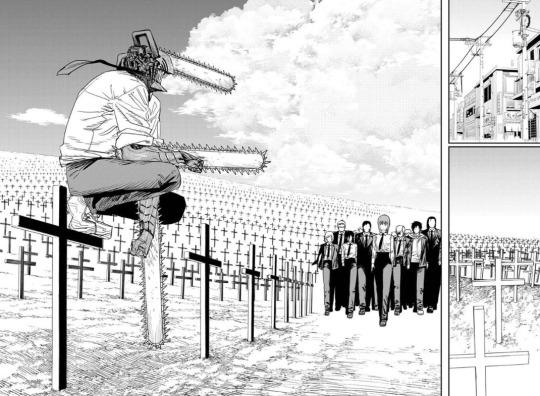
Link down below! The video is amazing! I recommend watching it as a chainsaw man fan!
https://youtu.be/5bifn15-BnI
#please reblog and like! <3#feel free to share your own thoughts and opinions!#chainsaw man#pure brilliance#Tatsuki Fujimoto#spoilers#anime#manga#csm#makima#denji#power#aki#chainsaw man meta#chainsaw man analysis#meta#analysis#meta analysis#mha#bnha#lov#Youtube#denji x reader#makima x reader#aki x reader#chainsaw man art#csm art#csm spoilers#angel devil#chainsaw man spoilers
139 notes
·
View notes
Text
sometimes I think about how in Chainsaw Man humans will stay dead and devils will cycle between hell and earth for all eternity
#I think about it#and I get sad about it#if heaven exists in csm it only exists for humans#and hell only seems to exist for devils#on earth they’re together (and hurt each other)#(and love each other)#(and fear each other)#for the rest of eternity they are apart#idk man it hurts#thinking about how Aki and Angel are only together for as long as they’re alive#and then they’ll never fucking see each other again#it’s cool it’s fine#and Angel cannot rest#devils exist to eat and be eaten. again and again. death does not come.#let him be free#sorry I’m listening to Family Tree (Intro) by Ethel Cain and having a time#I can’t stop listening to it#it’s my endless cycle lmao#chainsaw man meta#csm meta#hell mention#death mention#chainsaw man#csm#csm aki#csm angel#heaven mention#my thoughts#my csm thoughts#meposting
27 notes
·
View notes
Text
We always consider Aki as "the parent" in Hayakawa family, but who's gonna be Aki's guardian?
Kishibe fits that role perfectly.
Imagine, Kishibe was the one who took Aki in after he lost his family. He was the one who introduced him into Public Safety Devil Hunter. He was the one who partnered him with Himeno.
And when Aki was about to visit Hokkaido, bringing Power and Denji with him, who was the choice for taking care of Nyako? Kishibe. You don't ask for your superior to look after your pet unless you're really close to him. Power didn't ask for Kishibe, Aki did.
When Aki is having doubt about getting Division 4 involved with Gun Devil and considered to back out, who's the one he's talking to? Kishibe.
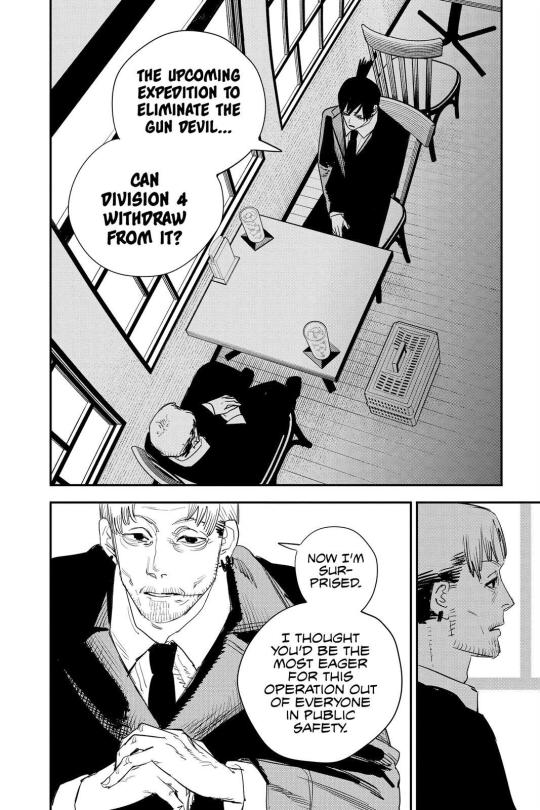
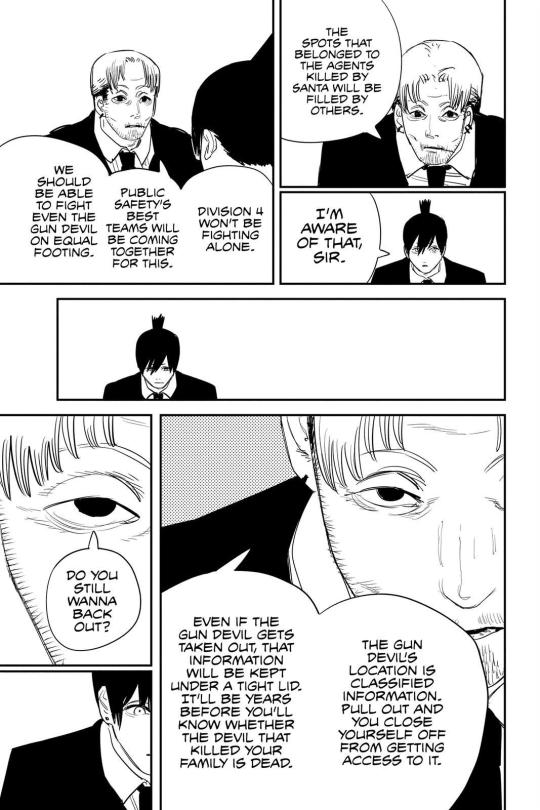

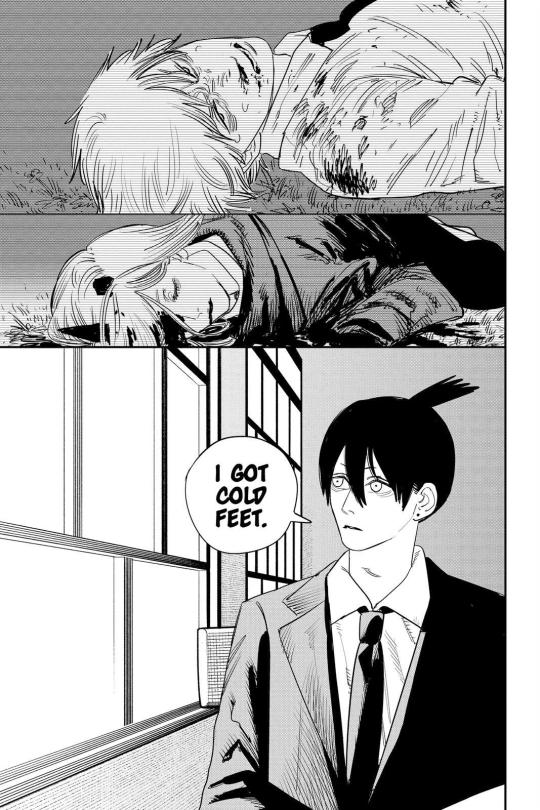

I think, Kishibe will always remain to be a father figure for Aki.
And despite his flaws, Aki could grow familial love towards Denji and Power.
Because once, he was just like them.
#chainsaw man kishibe#kishibe#hayakawa aki#aki hayakawa#hayakawa family#chainsaw man meta#chainsaw man
263 notes
·
View notes
Text
get ready to read me dumping all of my feelings for makima here (spoilers in the read more!)
while i was doing laundry just now, i'm reminded of how i felt when i first read chainsaw man, and how... empty i felt after finishing part 1. i can't remember when did i first read it, because it's been... a while but i do remember at the time, what really caught me off guard about makima is how... much i excused her behavior towards denji and everyone around her just because she's in a form of a woman.
god, that's the biggest mistake i made right there.
i actually felt betrayed by fujimoto when i finished reading chapter 74 for the first time. seeing makima laughed at denji's face for naively putting his faith on her. it felt like i was the one being mocked. i actually had to take a break after reading it because i felt so angry at makima.
but now, after... going through some traumatic shit myself that's pretty similar to what happened to denji... i kinda felt like a fool for believing makima's... facade in the first two chapters. and i think that also has something to do with the current climate of feminism and how... asian culture had this weird gender essentialism thing where people can't process the thought of women being evil without being outright obnoxious/rude about it. combined the two, and you got people reading fictional works and thought "ah there's no way this female character is evil, she's too nice"
hell, just like me, there are people out there who think of this when it comes to women in their lives too.
and to see this manga tackle such... sensitive issue in this very subtle way, i'm also grateful to fujimoto for not... ridiculing denji too much for believing makima. he's not at fault here, no matter how much stupid mistakes he made, i can never blame him for falling into makima's traps. because he is starving for affection, for acceptance, for kindness. just like a lot of people, he have difficulty understanding that not all kindness, acceptance and affection are unconditional.
but we always tried our best to think positively of other people. so no, it's not your fault if you ended up trusting the wrong person, things... happened. for a reason, i hope so.
and just like i mentioned before about asian's gender essentialism bs and the current social climate regarding gender equality etc, it is very rare to see women, especially evil women represented in a way that isn't a) obnoxiously loud, b) boldly sexual and c) stupidly weak when confronted with men
so, really, i'm glad i picked up the manga again after i throw it away from my first reading. because now i get to appreciate just how... complex makima as a character is. in my current mindset, i'm able to enjoy how cool yet terrifying she is. but also how... surprisingly vulnerable her inner mind is, after knowing that what she really desires is nothing more than just an equal-footing relationship with another person. it makes me realized that... really even abusers are still human beings.
i'm not trying to forgive abusers here, they're actively doing things for their own selfish reasons, but. i think there is merit in understanding how... bad people can become bad. "nature vs nurture" and all that.
tldr'; i just think makima is pretty fucking neat and people who be like "oh she's truly evil" can benefit from looking at her character in a more nuanced way. especially if you're someone aspiring to write complex character with subtle mannerisms.
#chainsaw man spoilers#makima#chainsaw man meta#kinda? idk#but yeah if you can't guess yet#i love makima#yet i also hate her#you get what i mean
32 notes
·
View notes
Text
Another thing I like about Chainsaw Man: It has "fanservice scenes" that aren't sexualized. Alright, hear me out, I have examples. (Some of which are light spoilers, but I'm pretty sure I talked around anything serious.)
"Flashback to a naked devil chick wandering around the wilderness with a cat" sounds like a fanservice scene...but the framing of the panels/shots, the visible parts of Power, and the fact that Makima hadn't started hosing her down every other week means that it's not sexy.
"Said devil chick takes a bath with the main character" definitely sounds like a fanservice scene...but the framing, Power's emotional state, and Denji's lack of reaction (despite being an infamous horndog) means that it's not sexy.
"Mostly-human (it's complicated) chick turns her school uniform into a sword and fights a devil in her underwear" sounds like a fanservice scene, and it definitely comes closest out of these. You can clearly see sexy bits like her chest and midriff, for instance. But Asa isn't fighting in sexy poses, the panels focus on the action rather than trying to make her sexy, and of course it isn't long before she's splattered in devil blood.
Now, let's clarify what I'm saying. I'm not saying nobody could find these scenes sexy; I don't think it's possible to create such a scene. And I'm obviously not saying CSM never has fanservice scenes; Quanxi and her (harem? polycule? squad?) have multiple...lesbian orgy panels?* framed in a sexual manner. What I'm saying is, it's obvious that the orgy panels were drawn sexy for a reason, because they're contrasted with an extended sequence of a very un-sexualized naked Power.
Fanservice scenes are omnipresent—not just in Japanese media, but in the West, too. As a sex-repulsed asexual, this is very obvious to me in a way I assume it isn't for most people...but as someone who exists in the same world as all you allosexuals, I've grown numb to it unless it's really obvious. I'm used to artists in a visual medium leveraging any scene where an adult woman partially disrobes for titillating viewers who are into that, and I've made my peace with that. Fuck, I'm not even surprised when artists do that with sexual violence or minors or whatever. It's a bad thing, but it's a fact of life.
And here we have Tatsuki Fujimoto, with scenes of naked or near-naked women which aren't sexualized. And I'm pretty sure† it's not just my ace brain not recognizing what heterosexual boys are expected to like about the scene, or some artistic or technical deficiency obscuring the intent, because look at Quanxi.
Power being naked in the wilderness could have been sexualized, but it was just a signifier that she's wild and uncivilized. Power being emotionally vulnerable in the bath could have been sexualized, but it was just a signifier of that vulnerability. Asa stripping off her uniform to use it as a weapon could have been sexualized, but it was just a signifier of her desperation.
* Hell, even the Quanxi orgies have a purpose beyond titillation. She's obviously a foil for Denji, living the life he thinks he wants. The scenes with her fiends emphasize the lust that she and Denji share. It's not a creative decision I'm 100% comfortable with, but Quanxi's sexuality is obviously not just an attempt at shoehorning some lesbian sex into the manga to draw in horny teenaged boys.‡
In a world with so much female nudity thrown in for mere fanservice, I feel like it's worth pointing out artists who do better. Mangaka don't need to write pure Christian stories without anything vaguely sexy in them to appease us social justice warriors; they just need to have a point beyond sex appeal when they draw naked women. And it doesn't have to be a deep point! It just has to exist!
-
† Though not certain—part of me expects to hear back from people who're confused about how someone could think those scenes weren't sexualized.
‡Why are straight dudes into lesbians, anyways? Is that weird? It seems weird.
BELATED EDIT: Of course, right before this popped off my queue, chapter 110 had to have some panels of Asa's de-uniformed body that feel like they were framed for fanservice. I thought that it was a Denji's-gaze sort of thing and it would lead to his horniness driving him to do something, but it didn't really?
It could still be a Denji's-gaze thing and not a bog-standard male-gaze thing, but the only reason I'm giving this possibility any weight is the previous 109 chapters.
83 notes
·
View notes
Text
Remember when I said in a post that when Flapjack sacrificed himself by fusing with Hunter to save them is similar to the moment when Pochita sacrificed himself by fusing with Denji to save him?


It turned out to be true and now Hunter has the teleportation powers that Flapjack had in the same way that Denji inherited Pochita's chainsaw demon powers.
Now that I think about it, Hunter and Denji are similars because they have a smug and rude face but that's just a facade to hide how lonely and traumatized they are and suffered terrible abuse by people they loved (Belos and Makima) and wanted to please because they felt indebted to them for giving them love and a better life only for said people to reveal that they never cared about Denji and Hunter as people but are with them because they remind them of someone they really love and/or idealize (Caleb and chainsaw demon).
#the owl house#the owl house spoilers#the owl house meta#the owl house analysis#toh#toh spoilers#toh meta#toh analysis#chainsaw man#chainsaw man spoilers#chainsaw man meta#chainsaw man analysis#toh hunter#hunter the owl house#chainsaw man denji#denji chainsaw man#csm#csm spoilers#csm meta#csm analysis
35 notes
·
View notes
Note
sorry to bother but could u elaborate on denji almost becoming quanxi??
absolutely no bother i love analysing and i really love this theme in csm. also warning that this will be a bit disjointed because im just writing whenever a have a little time lol
ok, so we must first think of how Fujimoto writes side characters. they are there to not only enhance the world and plot but also serve the narrative in a more symbolic way too. like the three immortal brothers aren't only there for absurd dark humour but also because we need a reminder that just because this world is seeped in death, life is still precious. also, Aldo's moment of realisation and begging for forgiveness was in connection to the theme that ignorance is bliss, as in when you close your eyes to the truth for too long, reality will hurt you.
let's first look at the more surface level similarities between Quanxi and Denji.
in her very first appearance, she is basically living out what Denji believes to be his dream: having sex with beautiful women.

she is a hybrid, like Denji is, though we are not exactly clear on what her devil heart is (i think Arrow or Bow devils?), and she is incredibly strong:

regarding Quanxi herself, she is willfully ignorant, believing that to be the key to her happiness:
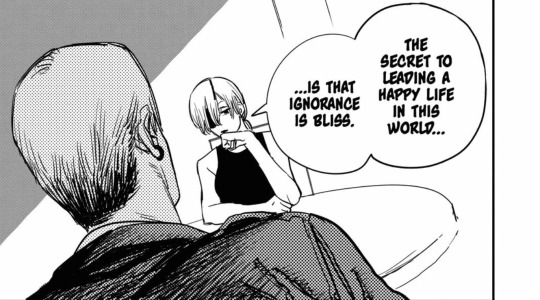
and that is the core principle of her character. we can see it even in the small moments before this exchange, like when she and her girls are in a sushi restaurant and Pingtsi tells her some facts about fish, and her mood is soured by it.
during the fight with the dolls, this is the advice she bestows on him:

and after the international assassins arc concludes, we can see him really living it, we have plenty of key moments where Denji acts out of wilful ignorance, avoiding reality wherever possible. it even seems to work out for him.


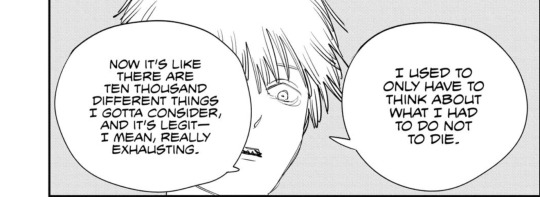
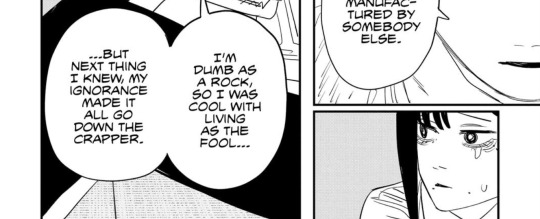
until it doesn't. and there is a choice before him: close his eyes and continue to live under the belief that Makima is his saviour or open than and face reality.
if he were to live life as Makima planned he would've become a blind tool whose only hope of finding happiness would be to adopt ignorance in the same way Quanxi has. tools know nothing except how to be used, and it doesn't ultimately matter if they change hands (like how Quanxi is on Makima's side through the Control Devil arc), as long as they serve their purpose.
there is, of course, A LOT more to be said about these themes of ignorance vs knowledge and the balance between them in Chainsaw Man but i think i've summed the connection between Quanxi's fate and Denji's possibilities well enough here.
#this isn't as extensive as i would like it to be but i hope its good enough lol#ask tag#anonymous#chainsaw man#chainsaw man manga#chainsaw man spoilers#quanxi#denji#chainsaw man meta#laila.txt
25 notes
·
View notes
Text

actually obsessed with the composition of this frame. the lines of the debris pointing like the barrels of guns to his head. its dynamic and at once claustrophobic
46 notes
·
View notes
Text
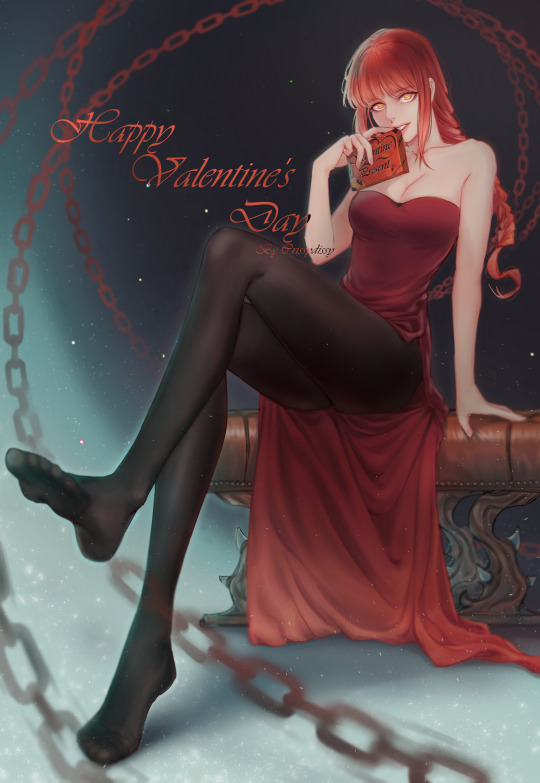

Happy Valentine's Day~ ♥
#chainsaw man fanart#makima#csm fandom#chainsaw man#illustration#valentine's day#gorgeous#my art#chainsaw man meta#chainsaw man makima
19 notes
·
View notes